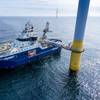EU Report Recognizes Need for Port Investment Stability
The European Parliament has officially adopted the Berendsen report, an own-initiative report on “building a comprehensive European Port Strategy” (585 in favor, 21 against, 26 abstentions).
The European Sea Ports Organisation (ESPO) welcomed the support for the strategic and vital role that Europe’s ports play for European society and economy. ESPO supports the Parliament’s plea to further harmonize the measures to strengthen the resilience and protection of Europe’s critical infrastructure, including ports. The ports look forward to the proposal to review the current Foreign Direct Investment Regulation, which is due to be released next week.
For ESPO, this review should oblige all EU Member States to implement a foreign direct investment screening system and carry out screenings in a more harmonized manner to level the playing field within Europe and contribute to more legal certainty for potential investors aiming to invest in European ports. ESPO welcomes that the report underlines the importance of a more stable investment climate and predictability in investment assessments.
ESPO further welcomes Parliament’s focus on putting the competitiveness of Europe’s ports to the forefront. The Parliament is asking for support in developing hydrogen infrastructure in ports as well as speeding up the permitting procedures. It further calls for avoiding carbon and business leakage, avoiding excessive administrative burden, boosting of hinterland connections to and from ports, as well as for providing dedicated port envelopes under the Connecting Europe Facility.
Overall, ESPO believes that this report should pave the way for an approach ensuring a fair balance between strengthening Europe’s security and competitiveness on the one hand and safeguarding an open trade and attractive investment environment and the resilience of strong supply chains that are vital for Europe’s society and economy on the other.
Isabelle Ryckbost, ESPO Secretary General, said: “This Parliament report is a strong document. It comes at a right time.”
Initially, the first Committee draft of the EU Port Strategy proposed protectionist measures, which, if implemented, would have led to limited opportunities for the EU to foster global trade partnerships, said shipowner group Danish Shipping which has voiced its satisfaction that the European Parliament members have now altered the own initiative report, shifting focus from initial protectionist measures to emphasizing the vital role of European ports.
The first strategy proposal would have called for an end to free competition by restricting non-EU shipping companies from moving goods within the EU. This could potentially lead to similar initiatives in other parts of the world and thus ultimately harm the European shipping companies which operate and compete globally.
MEP Bergur Løkke Rasmussen has played a significant role in steering the strategy-paper away from the potential negative impacts of protectionism.
“The EU should be careful not to lean towards protectionist measures. When EU advocates for regional policies, it may provoke retaliatory actions from other countries than China such as countries in ASEAN, Oceania, South America, and other regions too,” said Rasmussen.
“The European Union should embrace trade from every corner of the globe and refrain from impeding it. Our shipping companies heavily depend on unrestricted access to ports worldwide and the principles of free trade. Consequently, I am delighted that the detrimental protectionist measures initially proposed in the first strategy draft have been eliminated,” said Jacob K. Clasen, Deputy CEO Danish Shipping.








